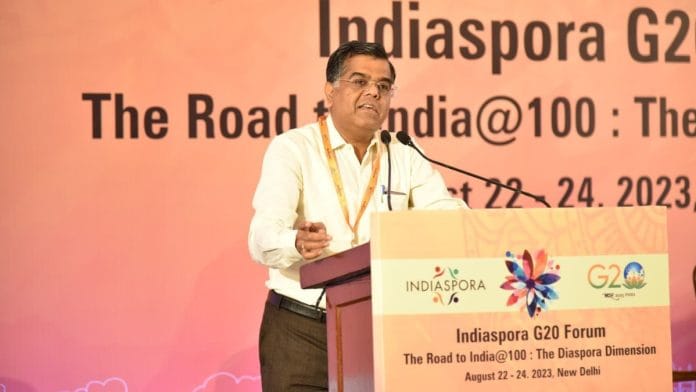New Delhi: Finance Secretary T.V. Somanathan has said that the Indian diaspora could help the country become a 10 trillion dollar economy by 2030.
Addressing members of the diaspora in Delhi, Somanathan spelt out a three-channel approach – flow of funds, trade and knowledge transfer – through which India could harness the resources of its wide diaspora.
“The diaspora, in a larger sense, creates a connection between the producers and the consumers of the two countries – the mother country and the country of residence,” he said.
The Indian population in different countries creates demand for Indian goods in foreign lands, which results in a much larger trade relationship between the countries, he added.
Somanathan said India, the world’s 5th largest economy, has a plethora of opportunities. He said the country has shown an upward trajectory as growth rate remains higher than the top four economies of the world — US, China, Japan and Germany.
“In terms of the size of the opportunity, the growth, the delta between where we are and where we will go, India is arguably the biggest development opportunity of the future because we are large and we are growing faster than the other larger economies.”
The finance secretary’s address emphasised how investments from the Indian diaspora could be a catalyst in achieving the $10 trillion mark in the next seven years. The diaspora has the power of influence in the countries of residence, he said.
In addition to this, Somanathan also said knowledge transfer was a key area in which the diaspora could add to India’s growth.
“The diaspora has valuable skills, experiences and contacts abroad through which they can transfer knowledge to the mother country. Literature suggests that Chile has been one of the biggest beneficiaries of this,” the finance secretary said.
Somanathan suggested the diaspora visit the country’s colleges and encourage collaborations on technological and literary projects.
He added India’s diverse and young democracy was an advantage for the country as well as for anyone investing here.
Members of the diaspora, however, expressed concerns about the current democratic functions in the country, with one singling out “lagging” judicial reforms. They said it was one of the reasons for not investing in the country.
Other members raised issues of unequal labour representation and pay gap. Various suggestions were given on encouraging more women investors in the country. The diaspora members also requested the finance secretary to work towards a balanced growth of income among the population in India, ensuring each section of the society benefited from the growth.
Somanathan assured the diaspora of rapid and effective action on these matters and requested for increased cooperation from their end.
Somanathan concluded his address, saying: “In the coming years, investment may be more important than philanthropy, technology transfer would be more important than investment and knowledge transfer would be more important than money. Small but sustained engagement from each member of the diaspora in India may be more important than big and sporadic interactions.”
Also read: Modi can’t prove India is 5th largest economy. Data will fail him






